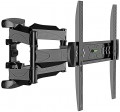Max. size
The maximum size of the TV screen that can be installed on the stand/mount. Like the minimum size (see above), it is in some way a conditional indicator — TVs with a larger size can also fit for the mount, and then the main determining parameter will be the maximum weight (see below).
Max. weight
The maximum weight of the TV that can be installed on the mount/stand; more specifically, it is the maximum weight that the mount/stand can support for an indefinitely long time without any negative consequences. Unlike the screen size described above, this parameter is accurate and should not be exceeded: perhaps the stand/mount will not break immediately under excess weight, but this can happen at any time, and such a breakdown is not covered by the warranty.
It is worth considering that for classic stands with several shelves (see "Type"), the maximum wheight is usually indicated for the entire structure as a whole and is the sum of the loads for each individual shelf. Thus, the maximum weight of the TV is not limited by the total maximum wheight, but by the maximum wheight for one shelf. This does not apply to stands with mounts; they usually list the maximum wheight on the mount, in which case it corresponds to the maximum weight of the TV.
The screen size is directly related to the maximum wheight (after all, a large TV weighs more). Typically, for screens up to 24", structures with a maximum wheight of about 5-6 kg are usually quite enough, for a 32" device, about 12 kg may be needed, large 55" screens reach a maximum weight of about 25-30 kg, and in the case of plasma panels, these figures increase by 1.5-2 times However, anyway, before choosing, you should clarify the weight of the specific TV model for which the stand/mount is selected.
Minimum distance from the wall
The smallest possible distance between the wall on which the mount is hung and its farthest protruding point. First of all, the overall compactness of the design depends on the minimum distance: if you do not want the TV to protrude far forward from the wall, you should pay attention to models with a small minimum distance. And if the mount provides length adjustment, this parameter determines the limits of such adjustment.
Max. distance from wall
The maximum distance from the TV mounting point to the wall (in the case of ceiling mounts, to the ceiling) provided by the mount. See "Minimum distance from wall" for details.
Built-in level
The presence
of a water level on the body of the device greatly facilitates the installation of a wall mount, helping to hang the TV mount perfectly straight.
Upward tilt angle
The maximum upwards tilt angle from the vertical of the installed screen. The larger the tilt angle, the wider the adjustment possibilities, however, in fact, an angle of more than 5° is rarely required.
Downward tilt angle
The maximum downward tilt angle from the vertical for the installed screen. As with the upward tilt angle, the larger this angle, the wider the adjustment possibilities; however, downward tilt is usually required more frequently (the TV may be installed under the ceiling), and its angle can be as high as 15-20°.
Turn angle
The angle within which the screen installed on the mount can rotate. Measured from far left to far right. In modern models, it can reach 180°.

